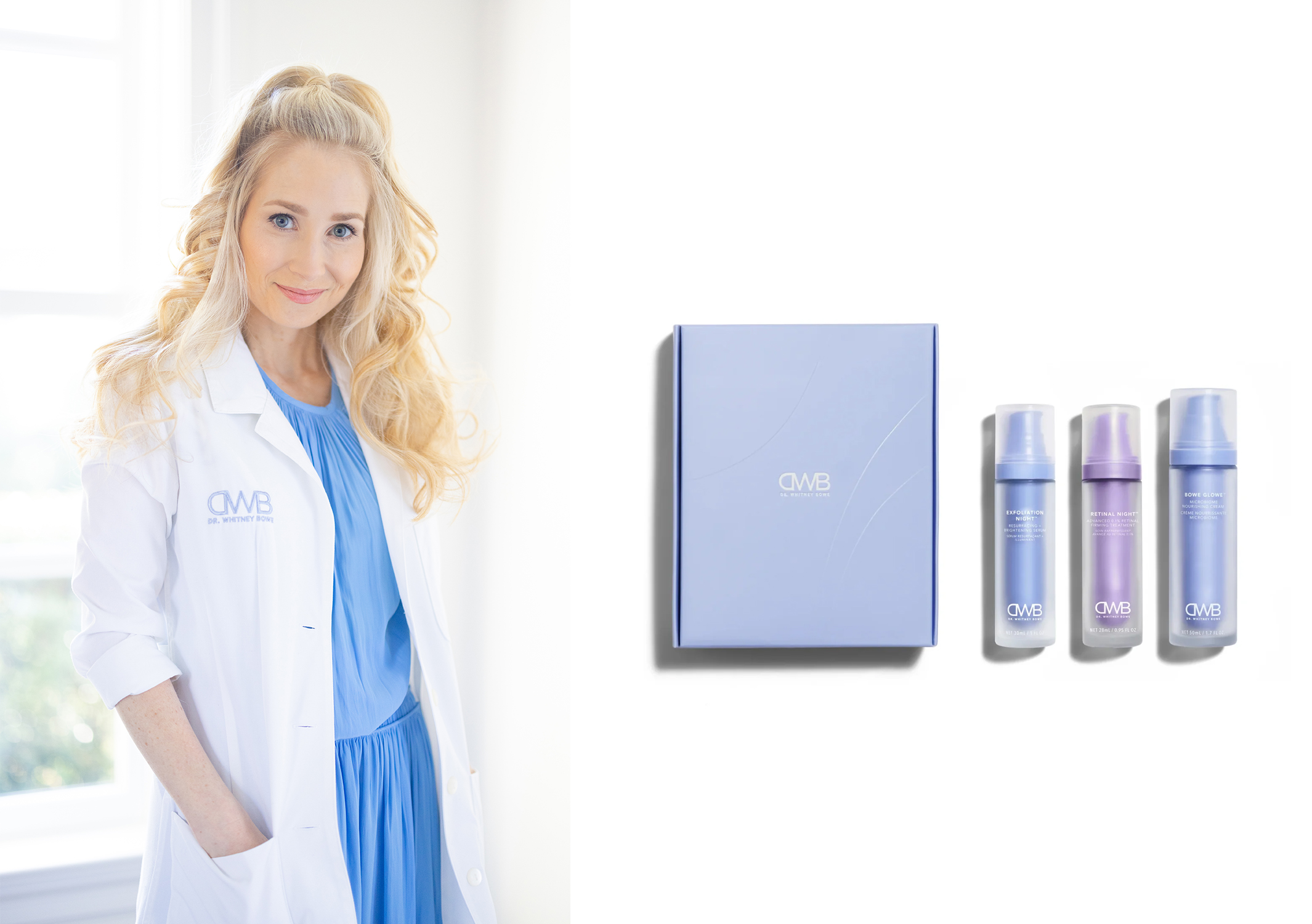Hair Loss? Skin Care? Brittle Nails? Reasons to seek out a Dermatologist! Q & A with Dermatologist/Founder Dr. Whitney Bowe.
Meet Dr. Bowe– an internationally renowned pioneer in her field and one of the most sought-after experts for national platforms like Good Morning America, The New York Times, The Wall Street Journal, Allure, and Vogue. Known as the “3D Derm”, Dr. Bowe optimizes skin health by targeting the skin from the inside out and the outside in, using the science of the skin-gut-mind connection. Her skin treatments are iconic. Her signature radiant aesthetic earned its hashtag: #thatboweglow.
Beyond her practice, Dr. Bowe is specifically known for her expertise in strategic, high-impact skincare and product formulation. As CEO and Founder of Dr. Whitney Bowe Beauty, Dr. Bowe incorporates her knowledge and expertise as a practicing board-certified dermatologist and published research scientist into formulating disruptive products in the skincare space. Dr. Bowe is equally passionate about empowering people globally to learn to streamline and optimize their skincare routines to achieve radiant skin that glows with health.
–Please explain the scope of a dermatologist’s work. Do you only treat patients’ skin? Are scalp/hair and nails included? What else?
Dermatology covers all things related to skin, hair, and nails. People are often surprised to learn that hair loss, thinning eyelashes and eyebrows, and brittle nails are all within the scope of a dermatologist’s expertise! Of course, dermatology covers conditions like acne, rosacea, eczema, and psoriasis, but some of us are also experts in cosmetic procedures.
– What makes this specialty different from primary medicine?
Although dermatologists focus primarily on the skin, hair, and nails, I’m very excited that many of us, including myself, focus on taking a more integrative approach to the skin. I’m a firm believer that healthy skin is both an outside and inside job, and small daily changes can make a meaningful difference, including a focus on our stress levels, nutrition, and sleep habits. That’s why my cosmetic dermatology practice also centers on an integrative approach to skin health based on the skin-gut-mind connection. I was so honored to be awarded a Presidential Citation from the American Academy of Dermatology for my work examining the impact of nutrition on the skin.
– When should we seek a dermatologist? What are some common signs/symptoms that lead people to reach out to a derm?
If you struggle with a skin condition, it’s always best to get a diagnosis and treatment plan from a dermatologist. So many people who have flaking skin, red skin, dry patches, or persistent breakouts are surprised to learn that what they struggle with has a diagnosis, and that there are safe and effective options that can help control their skin conditions. Of course, getting your skin checked out for skin cancer is another very important reason to see a dermatologist. However, I encourage anyone who is struggling with skin, hair, or nail concerns to seek out a dermatologist’s expert opinion. Sometimes, subtle things such as brown spots or thinning of your eyebrows can even be a sign of an underlying medical condition that allows us to catch the diagnosis early. Furthermore, skincare is very personal, and there is no one-size-fits-all approach to optimizing your skincare routine. Something as simple as reviewing your skincare routine with an expert can help you feel empowered and confident as you decide to nourish and nurture your skin.
– It’s still Women’s History Month! Are there issues particular to womxn skin health? Is there some evidence that stress levels impact some groups more than others?
Beauty sleep is real! And, getting consistent, quality sleep is a challenge for so many of us. I view sleep as part of my skincare routine and here’s why:
Sleep keeps our skin looking youthful and bright. Just 2 nights of poor sleep is associated with measurable changes in the skin including reduced skin elasticity, dullness, dark circles under the eyes, and increased markers of oxidative stress in the skin. Poor sleepers are also more likely to have more fine lines and uneven pigmentation in the skin.
Sleep helps to keep skin hydrated and helps to keep your skin barrier healthy. Poor sleep has been linked with dehydration of the skin and skin barrier disruption (increased transepidermal water loss).
And, sleep helps to keep skin clear and can help prevent breakouts and acne. Both stress and poor sleep have been linked with acne. When sleep is compromised, stress hormones increase and this can lead to oxidative stress and acne. It can be a vicious cycle—acne can cause emotional stress and lead to poor sleep and poor sleep can lead to more acne.
Here are a few steps I take to help optimize my sleep, which is no easy task for me, which is why I put thought and planning into it:
-Limiting my caffeine after 2 PM
-Blackout shades
-Silk sleep mask
-Keeping my DWB Beauty Night Mode capsules by my bed so I can take 1-2 capsules if I wake up in the middle of the night with no groggy hangover the next morning. They contain L-theanine, Vitamin D, and Lemon Balm and are non habit forming. Night Mode has been a game-changer for me.
-keeping my room very cool at night
– Tell us about your brand. What prompted you to start your brand?
I’ve practiced dermatology for over a decade and lectured around the world as a thought leader in my space. I believe that just because something has always been done a certain way, that doesn’t mean it’s the right way or the BEST way. I use this lens not only as a dermatologist and trained research scientist, but also when formulating our innovative Dr. Whitney Bowe Beauty skincare. It’s the combination of my obsession with science and research, combined with speaking to people who are experiencing skincare and skin issues in real time that puts me in such a unique position to create disruptive skincare that drives impactful, measurable results in the skin. Here’s the path I take when developing new products for DWB Beauty:
Step 1: Identifying the Concern- I start by listening to my patient’s stories, which inspire me to roll up my sleeves and work on solutions to their skin concerns.
Step 2: I research the latest ingredients and technologies to address these concerns effectively. This involves diving into scientific literature and consulting with leading chemists.
Step 3: Collaborate with my team to develop a product from the ground up, using the researched ingredients and technologies. The goal is to create a formula that delivers clinically meaningful results.
Step 4: I test the product with a select group of patients, refining it based on their feedback.
Step 5: Each product undergoes rigorous third-party testing to ensure efficacy and safety.
Step 6: Continuously refine the formulation based on feedback and testing results, aiming to exceed expectations.
Step 7: I refuse to bring any product to market that doesn’t meet and exceed my expectations. It’s a labor of love, but one that I know is worth it, knowing that I am offering my patients and customers something that will truly make a difference in their lives.
-What is one piece of health-related advice with patients or the public?
With Women’s History Month in mind, it’s important to me to recognize that women have become comfortable placing their own needs last. But, it is powerful and proactive to step outside of that comfort zone and learn to advocate for your own needs, especially when it comes to your health. If you question something and feel concerned, make that appointment for your own peace of mind.



Leave a Reply